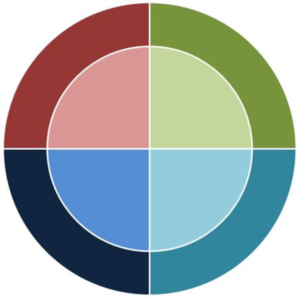 How do you decide what styles profiling product to select?
How do you decide what styles profiling product to select?
It’s overwhelming, and a little confusing.
Enter …. experienced consultant to guide through it for you. I’ve seen the good, the, bad and the ugly of what’s out there, and I can tell you there’s more than one choice … and many choices in styles profiling will work for you. The trick is how to narrow it down.
The Facilitation Decision: Do we need a facilitated event?
Although it’s easy to fall into the thought that you can just “take something online” and get a report that assesses your style, consider whether that’s indeed what you want out of it. A online-generated profile will identify your style. All good! But doing something with it is a whole other dealio.
There is a world of difference between independently discovering your style and working through the results to understand what it means and how to adapt.
If you do not have the flexibility to gather your team together for a facilitated event, then an online assessment may be your only choice. You might argue that getting the assessment independently and without processing or training is better than nothing at all. As an expert in professional development, well okay yeah … at least you’re getting exposed to something and it’ll prime you for being prepared to do something more committed in the future. There’s not much of a risk in getting the information about your style. You probably won’t go out and use it for evil.
The Budget-Driven Decision: How much can we spend?
Here lies the deciding factor in how your styling report will come to you. Available in the market is a varied range … from a cadillac version to a quickie online version.
Wilson’s Social Style Management If you have a relatively unrestrained budget, I suggest Wilson Learning Social Styles Management. As a former certified instructor for Wilson, I know it to have amazing psychometric measures, a top notch report generated for you, well-seasoned facilitators, and a huge database. It also provides a comprehensive measuring that includes 5 other people assessing your style and this can be extremely useful because the participant can gain insight as to how his intent in influencing may be misread by others. I love the model with its Assertiveness and Responsiveness scales and an easily-remembered model. But this will cost not only the per person profiling fee (maybe $300 per workshop attendee and up), not to mention a certified Wilson facilitator. Count on at least $4000 for the latter.
DISC Disc styling is popular and easily found in most markets, and they come from one of two providers – either TTI or Wiley. Both are well-established organizations and they work through a distribution network of approved partners. Instruments are self-measured and cost in the $100 range. The reporting is professional and includes terrific support information for assets and liabilities of your style, not to mention motivational considerations. These can be delivered with or without a facilitated event, but as emphasized earlier, the bulk of the value is lost.
The DISC models are built upon their own research but also utilize the same easily understandable model that helps it get incorporated into your language.
STYLES from Better-Leadership My business offers an affordable option with a self-assessment that I have designed and tested on my own. As a former engineer, I was comfortable writing an algorithm that measured typical characteristics of the most popular two measures in the styles market: assertiveness and context. It’s model uses common language that makes it easy to remember and more likely to get integrated into everyday use at work and home. I’ve been using it for several years and note that it’s reliability is spot on, and gets the workshop participants just as engaged as other instruments. Additionally, I build the “feedback from others” angle into it much like Wilson does, so that the participant can see how 5 others see him plus an average of those 5.
OTHER INSTRUMENTS Many others exist with either similar models (Tracom, SDI, or Birkman as a more complex model). There may be something in there for you as well, but only shopping and research will tell. Personally, too many of the models use technical language or complicated layers of models, thus rendering an analysis paralysis for the participants OR (more likely) the language is just not colloquial enough to remember a few days after the training workshop.
Reach out to me for more help on what the process entails to have me profile you and facilitate your team.